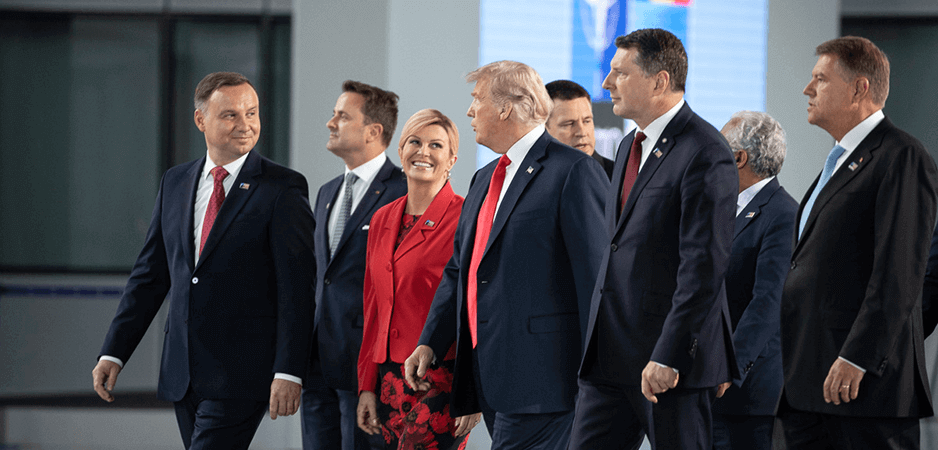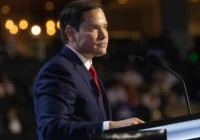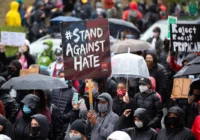How else can one describe President Trump’s constant and pointless tirade against the Western world’s most successful and effective alliance? Former US Ambassador Gary Grappo explains.
It’s not a headline anyone would ever have expected. Established to protect the recovering nations of Western Europe from a menacing Soviet Union, the now 29-member NATO has been America’s core strategic alliance since 1949. But Donald Trump has been on the warpath against NATO since his 2016 campaign for the presidency. Why?
Could Trump Have a Point?
Trump seems to waiver between NATO’s relevance — he’s referred to it on occasion as obsolete — and possible need, but he has never deviated from his central criticism of the alliance and its members: they sponge off the US. The United States picks up the largest share of NATO’s overall budget, about 22%. But it’s unclear whether President Trump’s harangues are based on members’ contributions to the NATO budget or their individual defense budget expenditures. Most of the American public is unaware that no NATO member is in arrears in its budget contributions to the bloc; some having actually increased these contributions since he took office.
If Trump is referring to individual members’ defense budgets, then he has a point. In 2014, NATO members agreed to establish a minimum goal — more of a guideline — of 2% of their national budgets for defense. In 2017, the US spent 3.57% of its national budget on defense. In that same year, only four other countries met the 2% threshold: the United Kingdom, Greece, Poland and Estonia. Four others are on track to meet this goal in 2018. When it comes to the proportion spent on defense as a share of GDP, Europe has fallen from just under 3% in 1989 to 1.95% last year, according to Forbes. But since Trump moved to the White House, most countries have been increasing their defense spending.
Trump’s criticism also has a certain resonance among many working-class Americans — i.e., Trump voters and others who struggle with health care, Social Security, childcare and other welfare-related challenges. Though spending on these programs is far from meager, when viewed against Europe’s more generous welfare programs, Americans wonder whether they are bankrolling Europe’s defense at the expense of their own well-being. Trump has struck a nerve that the Europeans must acknowledge. After all, Americans expect that all must do their fair share.
Is It All About the Money?
Trump’s sole basis for criticizing the alliance seems to come down to money, not surprising for the first president in US history with no prior military or government experience. He views NATO as a business proposition, though one wonders whether he might not see it as one of his golf club developments whose members are expected to pay dues.
It was always expected that America would outspend its NATO partners. The US comprises 51% of the allies’ total GDP, maintains a triad nuclear force — aircraft, missile and submarine force capable of delivering thousands of nuclear missiles against any potential foe — and holds worldwide defense and economic interests unlike any other member. (The UK and France also have nuclear weapons but a substantially smaller force than America’s.) Given its extensive defense commitments and interests, it shouldn’t surprise anyone that the US spends considerably more than its NATO partners. In addition, for most of NATO’s members, advanced weapons such as F-35 Stealth fighters, attack submarines, Apache attack helicopters and long-range B-2 strategic bombers are just unrealistic, not to mention unnecessary.
Nevertheless, 2% is a reasonable goal and Trump is right to keep members’ feet, particularly those of NATO’s larger economies, to the fire. His recent call that they increase spending to 4% is patently outrageous, however, since even the US does not and is highly unlikely to spend at such a level.
His ham-handed approach, such as attacking ally Germany for its energy expenditures on Russian gas and claiming NATO members owe the US for Europe’s defense, is tactless and unlikely to get the results that Washington should really want, and it ultimately undermines the integrity of the alliance.
Trump’s phlegmatic support of Article 5 of the NATO charter — “An attack against one is an attack against all” — runs counter to the commitments of every US president and every American Congress since Harry Truman. (For the record, it’s important to note that the US has been the only country to invoke that article, after the 9/11 attacks, which NATO members unanimously endorsed and supported.) His blistering criticism is more reminiscent of a street gang shakedown or mafia strong-arming for protection money.
Forgotten: NATO’s Indispensable Element
As befits his inexperience and apparent lack of understanding of the alliance, Trump fails to grasp the essential purpose and objective of NATO: collective security. It proved successful in prevailing in the Cold War, addressing the Balkans crisis of the 1990s and remaining engaged in the Afghanistan War.
Equally important, NATO has grown from just 12 — some fragile and facing internal communist challenges — post-World War II states to 29 nations firmly committed to the same values of democracy, liberty, and open markets. It includes some of the largest developed economies and provides the security underpinning for the world’s most successful economic coalition: the European Union.
Without that collective security, it’s fair to assume that America would be spending much more to meet its broad security interests around the world. The US can count on the diplomatic backing that most often accompanies membership. America’s closest global allies — Britain, Canada, France and Germany, among others — are members. Moreover, former Soviet bloc nations, such as Poland, Hungary, the Czech Republic, the Baltic States and others, are now members of NATO, having clamored following the fall of the Soviet Union to join the world’s most successful alliance and are now among its most fervent members. By any measure, NATO has been an overwhelming success and well worth the resources spent.
Today, in the face of newfound Russian aggression in Crimea, eastern Ukraine and the Baltics, the alliance will prove much more capable of resisting Vladimir Putin’s ambitions than could any one country, including the US.
It is not only the wrong way but the wrong time for Trump’s assault. Instead, he should focus on: increased joint efforts and resources toward cybersecurity within the alliance, perhaps the fastest growing threat at present; shared operations for Baltic security; North Atlantic and Arctic Ocean security; and the security challenges of migration, especially from the Middle East, North and Sub-Saharan Africa.
The Quiet Way: Diplomacy
Behind the scenes, US Defense Secretary James Mattis seems to be working to advance some of those goals, in spite of his boss’ obvious lacuna when it comes to America’s security interests. Flying beneath the radar, Mattis has secured a commitment by the alliance to the US Defense Department’s “30-30-30-30 plan.” The effort will require NATO to have 30 land battalions, 30 air fighter squadrons, and 30 ships ready to deploy within 30 days of being put on alert. A European Defense Initiative has also doubled its spending for 2019 to $6.5 billion. Mattis’ patient, quiet and deliberate diplomacy is achieving much more than Trump’s bullying.
If Trump’s thoughtless hammering of NATO members is a ploy to get them the pony up, then it’s decidedly vulgar and intemperate, considering these are among America’s very best friends and allies.
More likely, his attack on NATO is in line with his overarching dislike of and even repugnance for multilateral commitments. As a businessman, Trump looked at every relationship or deal as transactional; partners were to be used and coming out ahead — as measured in dollars — was all that mattered. But that isn’t how an alliance, especially this vital alliance, operates. America’s alliances, agreements, partnerships, international commitments and collaborative approach to diplomacy, trade and defense have earned it dozens of friends and allies around the world, among non-democracies as well as democracies. That’s something neither Russia nor China can claim.
Now, Vladimir Putin and Xi Jinping doubtlessly rejoice as they watch Donald Trump attack and undermine one of America’s best foreign and national security policy ideas — one they can neither match nor replicate.
The views expressed in this article are the author’s own and do not necessarily reflect Fair Observer’s editorial policy.
Photo Credit: The White House
Support Fair Observer
We rely on your support for our independence, diversity and quality.
For more than 10 years, Fair Observer has been free, fair and independent. No billionaire owns us, no advertisers control us. We are a reader-supported nonprofit. Unlike many other publications, we keep our content free for readers regardless of where they live or whether they can afford to pay. We have no paywalls and no ads.
In the post-truth era of fake news, echo chambers and filter bubbles, we publish a plurality of perspectives from around the world. Anyone can publish with us, but everyone goes through a rigorous editorial process. So, you get fact-checked, well-reasoned content instead of noise.
We publish 2,500+ voices from 90+ countries. We also conduct education and training programs
on subjects ranging from digital media and journalism to writing and critical thinking. This
doesn’t come cheap. Servers, editors, trainers and web developers cost
money.
Please consider supporting us on a regular basis as a recurring donor or a
sustaining member.
Will you support FO’s journalism?
We rely on your support for our independence, diversity and quality.






